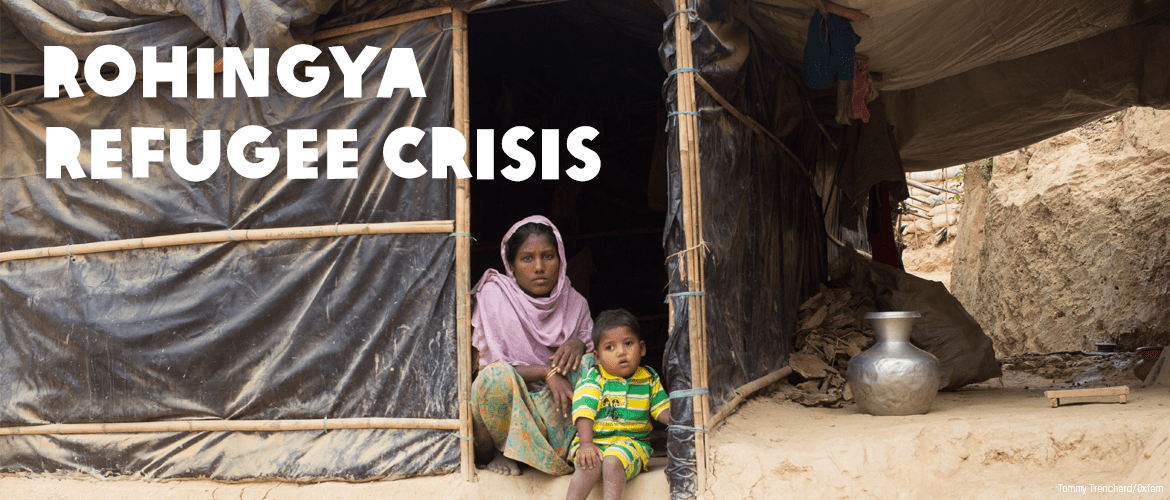
Over 900,000 Rohingya people have fled violence in Myanmar to seek refuge across the border in Bangladesh.
Almost a quarter are pregnant women, new mothers, and children under five. Sixty percent are children under 18.
Crowded together in makeshift camps with little or no food, shelter and clean drinking water, the risk of waterborne diseases is alarmingly high. Women, girls and children are also particularly vulnerable to sexual violence.
Oxfam Aotearoa’s Kelsey Taylor visited the camps in March to help us understand the challenges Rohingya refugees are facing, and what Oxfam is doing to help.
And now, a crisis within a crisis pends as the approaching monsoon season threatens to wash away homes – as many as 150,000. The first of the monsoon rains have fallen – only puddles are left on the ground now, but once the monsoon season is in full swing – with a predicted 2.5 metres of rain in three months – those puddles will become floods.
Oxfam is responding. We’ve reached over 240,000 of the most vulnerable people with clean drinking water, portable toilets, sanitation facilities and other essential supplies. But we need your help to prevent the worst from happening.
The fastest-growing refugee crisis in the world
Over 700,000 Rohingya refugees have arrived from Myanmar’s Rakhine State in Bangladesh’s south-eastern districts since August 2017. Hundreds more are arriving every week. They join hundreds of thousands who are already living in refugee camps and with local communities. All of these people are squashed into an area far too small to safely accommodate them. The number of people per square kilometre is more than 1000 times what is recommended for refugee camps.
Many have arrived injured and deeply traumatised by their experiences, with just the clothes on their backs. They need food, clean water and shelter to survive, but above all they need to feel safe. People are living in makeshift tents in hugely overcrowded settlements. Conditions in the camps are woefully inadequate and unhealthy, with overflowing latrines and contaminated water. They’re largely unlit and dangerous at night – women, girls and children are particularly vulnerable to abuse, exploitation and trafficking.
Oxfam is responding
We are currently focusing on providing water and sanitation and adapting to better deal with the crowded conditions and sheer numbers of people. We’re helping families prepare themselves for the approaching monsoon season. Oxfam is:
- Installing a sewage facility which will initially serve 50,000 people, which will rise to 100,000.
- Drilling wells and installing water points, toilets and showers. To help local communities cope with water shortages, we are providing an average of 300,000 litres of chlorinated water daily in the Teknaf area.
- Helping people stay healthy and hygienic by distributing soap and other essentials and working with community-based volunteers to emphasize the importance of clean water and good hygiene.
- Providing 23,000 households with vouchers that can be exchanged at local markets for nutritious vegetables and ingredients to supplement their basic rations.
So far, we have reached at least 266,000 people. You can help us scale up our response to the Rohingya refugee crisis.
Hear from people we’ve reached
“We used to go far away around the bushes to the toilet. At night I went with my friends but I was scared. Now we have a clean latrine next to our house and I’m not scared anymore.” Abul*, 10, poses next to the Oxfam latrine that was built near his home in Balukhali Camp.
“The children haven’t seen water like this for a while so they are really excited. The water tastes good – tastes so much better. We are really thankful for this water.” Habiba can now easily access clean water from four handpumps installed near her home – funded by Oxfam supporters
“We used to dig holes in nearby places to go to the toilet. I felt sad, it was so heartbreaking for my teenage daughters to go to the toilet like that. It has now become so much easier to go to the bathroom as it is so close to our home, and it is so much more dignified for my daughters.” Nur’s* mother is delighted that her and her daughters can now use a latrine close to their home – a latrine that was made possible by Oxfam supporters.
Shim*, 12, holds an Oxfam food parcel she received from a distribution at Kutupalong Camp. The parcel contains 3kg of flattened rice, 1kg of biscuits, 1kg of sugar and 2 soaps.
*names have been changed.
Make a donation today to reach people just like Abul, Habiba, Nur and Shim.





